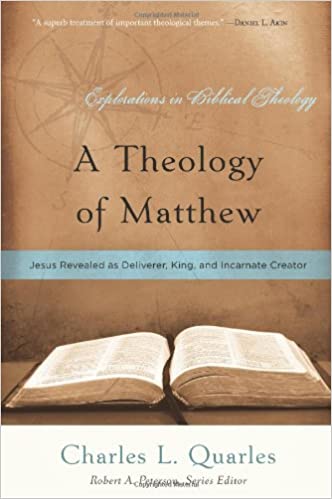A Brief Book Summary from Books At a Glance
by Mark Baker
About the Author
Charles L. Quarles (PhD, Mid-America Baptist Theological Seminary) is Research Professor of New Testament and Biblical Theology Charles Page Chair of Biblical Theology at Southeastern Baptist Theological Seminary. He is the author of multiple books, including a commentary on the Sermon on the Mount and the Exegetical Guide to the Greek New Testament on the Gospel of Matthew.
Overview
This book focuses on Matthew’s portrait of Jesus. While it could be titled A Theology of Matthew’s Christology, the whole gospel necessarily focuses on Jesus, so a theology of Matthew is a theology of Matthew’s Christology. This book looks specifically at Jesus’ fulfillment of four major Old Testament themes: Jesus as the new Moses, Jesus as the New David, Jesus as the New Abraham, and Jesus as the New Creator.
Table of Contents
Part 1: Foundations for a Theology of Matthew
1 Introduction to the Gospel of Matthew
2 Introduction to the Theological Study of Matthew
Part 2: The New Moses: Jesus, Our Savior
3 Matthew’s Development of the New Moses Theme
4 The Theological Significance of the New Moses Theme
Part 3: The New David: Jesus, Our King
5 Matthew’s Development of the New David Theme
6 The Theological Significance of the New David Theme
Part 4: The New Abraham: Jesus, Our Founder
7 Matthew’s Development of the New Abraham Theme
8 The Theological Significance of the New Abraham Theme
Part 5: The New Creator: Jesus, Our God
9 Matthew’s Development of the New Creator Theme: The Titles of Jesus
10 Matthew’s Development of the New Creator Theme: Other Descriptions of Jesus
11 The Theological Significance of the New Creator Theme
Summary
Part 1: Foundations for a Theology of Matthew
Chapter 1: Introduction to the Gospel of Matthew
The testimony of the early church is clear: Matthew, Jesus’ disciple, is the author of this Gospel. Though some modern scholars hold to a later date for the writing of Matthew (AD 80 or later), evidence in the gospel itself points towards a pre-AD 70 date. The Gospel was probably composed in Palestine, although other scholars argue for a Syrian provenance. Jewish Christians in Palestine were probably the original audience, although Matthew likely expected his Gospel to be widely circulated in the early church. Though there have been many proposals for the structure of the Gospel, Matthew probably adopts Mark’s simple outline based on geographical movement: “hist ministry in Galilee, a journey south to Judea and Jerusalem, and at last the passion in Jerusalem” (13). . . .
[To continue reading this summary, please see below....]The remainder of this article is premium content. Become a member to continue reading.
Already have an account? Sign In
